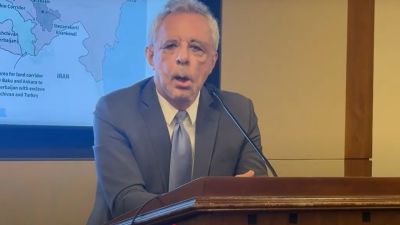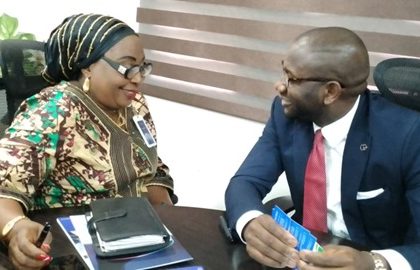
WASHINGTON — The United States has the ability to help reverse the ethno-religious cleansing of Armenian Christians and negotiate the safe return of one of the oldest Christian communities to its native homeland, a human rights advocate has said.
John Eibner, president of Christian Solidarity International, a Switzerland-based non-governmental organization, joined two Swiss members of parliament — Erich Vontobel and Lukas Reimann — and Vartan Oskanian, the former foreign minister of Armenia, for a Tuesday briefing on Capitol Hill about the continued plight of Armenian Christians, which is receiving scant attention in the U.S. and around the globe.
The Swiss-led delegation presented Switzerland’s peace initiative, which seeks to facilitate the safe return of displaced Armenian Christians to Nagorno-Karabakh, a region once home to over 100,000 Armenian Christians before they were expelled during a September 2023 offensive by the Azerbaijani military.
The region had a predominantly Armenian population, but was internationally recognized as part of Azerbaijan. Until the 2023 offensive, it had operated as a de facto independent state, known as the Republic of Artsakh. The assault followed an Azerbaijan-imposed blockade of Nagorno-Karabakh that lasted from December 2022 to September 2023.
“Does the U.S. believe that a favorable and lasting peace in the South Caucasus — a region of growing geopolitical and economic significance — can be built on the basis of ethno-religious cleansing?” Eibner posited.
“If the answer is no, then the U.S. should provide support for Switzerland’s peace initiative,” he added.
The ‘latest stage’ of ‘genocide’
Speaking with The Christian Post ahead of the briefing, Eibner stressed that Azerbaijan’s actions are part of “a historical process of genocide against the Armenian Christian community,” one that he noted has come in waves.
“It started in the late 19th century. Then there was the great Armenian genocide that basically emptied Turkey of Armenian Christians,” the CSI president said. “This is the latest stage. And if Azerbaijan is going to get away with this, then they can do this with impunity. And that’s not going to be the end of it.”
The human rights advocate expressed hope that the Trump administration will keep its promise to stand in defense of persecuted Christians, highlighting the Swiss Peace Initiative as one way the U.S. can support Armenian Christians.
“It doesn’t require military intervention or anything like that,” Eibner explained. “It just means that the United States says publicly that it would support Switzerland, as a neutral country, hosting talks between the government of Azerbaijan and the representatives of the forcibly displaced people, and to show that it expects Azerbaijan to cooperate.”
In March, the Swiss Parliament passed a motion to organize a peace forum between Azerbaijan and the representatives of the displaced Armenians of Nagorno-Karabakh. The bipartisan adoption of the motion led to the establishment of the cross-party committee “Swiss Peace Initiative for Nagorno-Karabakh” in May.
The plight of Armenian Christians often doesn’t receive much attention in the international media, Eibner said, unless it involves ethnic cleansing, which garners some coverage before the news cycle moves on.
If President Donald Trump or Vice President JD Vance spoke on behalf of Armenian Christians, then it would become news, Eibner believes. But Christians shouldn’t wait for the president to address the issue, he said, noting they can speak out themselves and urge the U.S. government to act, rather than remaining silent.
He believes Christian leadership within the U.S. should “publicly declare solidarity with the [persecuted Armenian Christian] community.”

Oskanian, who chairs the Committee for the Defense of the Fundamental Rights of the People of Nagorno-Karabakh, addressed concerns about the U.S. government’s hesitance to take a stronger stance against Azerbaijan.
‘Sends the wrong message’
He highlighted factors such as Azerbaijan’s ties with Turkey, a member of the North Atlantic Treaty Organization (NATO), an intergovernmental transnational military alliance.
While the former foreign minister acknowledged that “the United States views Azerbaijan as a partner on many levels,” he stressed that “these geopolitical considerations do not justify silence on the expulsion of 150,000 people from their homes.”
“This sends the wrong message and sets a very dangerous precedent, because the right of return is not a political concession,” Oskanian continued. “The right of return is a legal and moral obligation enshrined in [United Nations] conventions and international humanitarian law.”
The former foreign minister called on the U.S. government to lend political support to the Swiss Peace Initiative, asserting that it would provide a space to negotiate a right of return compatible with international and humanitarian law, as well as the law of non-discrimination.
“Look, this initiative is not about taking sides. It is not about giving legitimacy to one side over the other,” Oskanian said.
“This initiative is simply to provide a space, a neutral space where the silent voices can be heard and where representatives can sit together around the table and find a way forward, a way home.”
Samantha Kamman is a reporter for The Christian Post. She can be reached at: samantha.kamman@christianpost.com. Follow her on Twitter: @Samantha_Kamman








